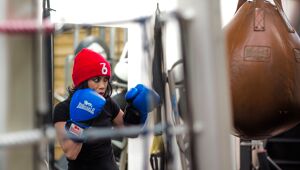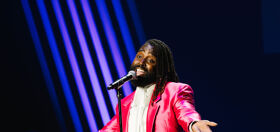
In these dark times, it’s important to hold onto the little things in life that give us hope, provide us with comfort, and bring relief. In that sense, Marcel The Shell—a “little thing” if there ever was one—has made his feature film debut at the perfect moment.
With big heart and humor, Marcel The Shell With Shoes On‘s story about carving out a place for oneself in a daunting world feels like a small miracle. And in its adorable star, the film gives us an emblem of hope, of ingenuity, and perseverance—a tiny icon with an outsized appeal for the LGBTQ community.
“Generally, I think Marcel focuses us on our similarities more than our differences,” writer-director Dean Fleischer-Camp shares with Queerty. “But he resonates because he is a small thing living in a world that was not made for him. I think people in the queer community can identify with feeling [that,] like you live in a world or a mainstream that isn’t considering you.”
By making the most of his circumstances and flourishing in spite of them, Marcel’s cheerful tenacity has been delighting audiences for over a decade, inspiring those who have ever felt like they didn’t belong. It was in 2010 that Fleischer-Camp and actor-comedian Jenny Slate first introduced the character to the world via a scrappy short film that became a festival favorite. With a faux-documentary style, the project followed Marcel (voiced with warmth and curiosity by Slate) as he went about his day, sweetly boasting about his lentil hats and his skis made out of toenails.
How about we take this to the next level?
Our newsletter is like a refreshing cocktail (or mocktail) of LGBTQ+ entertainment and pop culture, served up with a side of eye-candy.
After the short arrived on YouTube, it wasn’t long until Marcel was an internet sensation, spawning two sequels, two storybooks, and plenty of fawning fans. With the help of the indie cinema connoisseurs at A24, Fleischer-Camp and Slate have now brought their creation to the big screen, fleshing out his world for a 90-minute feature while preserving its small-scale charms.
Amusingly, Marcel The Shell With Shoes On folds the viral success of the original shorts into its plot, allowing its creators to address their own awe at his unexpected rise to fame, as well as some of the online chatter about Marcel, including one question that they both admit has always “baffled” them: Is Marcel a boy or a girl?

Early on in the film, Marcel goes on a livestream to mobilize his growing viewership to help find the rest of his shell community. Blink and you might miss it, but off to the right of the stream, questions come rolling in, including a string that read, “Marcel are you boy or girl?,” “Is she boy or girl,” “WHO CARES,” and, “Just because she has pink shoes doesn’t mean she’s a girl.”
Slate recalls seeing a number of comments just like those when the Marcel short first garnered views online, “I was like, ‘Why is everyone so fixated on it?” Like, who cares anyway? Would you know him more if, in your eyes, we just labeled him a certain way?” Gender was something she had never really discussed with Fleischer-Camp, saying that it was just an instinct to refer to the shell with he/him pronouns, but it was clear a vocal portion of viewers wanted to know. “It was all so surprising because it was so irrelevant to us.”
Related: Hiding in plain sight: 10 of the queerest cartoon characters ever
“The argument over Marcel’s gender has been going on for over 10 years now,” adds Fleischer-Camp, “so we thought that would be a funny thing to lampoon [in the film.]” But neither of them feel the need to respond to it in any definitive way, in the same way they avoid answering other questions that won’t “deepen the mystery” (i.e. “Why doesn’t he ever take off his shoes?”).
“I don’t really know; he’s a cartoon!,” the director laughs. “We generally just avoid all of that. I think it encourages people to experience him as an individual, and not as a preconceived notion about what a ‘kid’s character for girls is’ versus a ‘kid’s character for boys,’ versus, you know, all of those conversations. We just let him exist.”
But Marcel doesn’t just exist—he thrives. That he does so beyond a hard-and-fast binary, outside of societal norms, makes him an aspirational figure that LGBTQ audiences can see themselves in, cartoon or not. Well, that and the fact that he knows the power of a good pair of shoes.

So, does that make Marcel a queer icon? A shell of the people, Slate and Flesicher-Camp have no doubt it’s a title he would warmly embrace.
“He’d say it’s a huge honor,” answer Slate. “He’d say ‘thank you,’ he’d join in the Pride Parade, and he’d absolutely love it.”
“He’s limited by stride length,” Flesicher-Camp adds, “but I think he’d love to participate if he was able. He could be on a float, but it’d be a very tiny float—probably a roller skate.”
If that enduring queer spirit has been intrinsic to the character since the beginning, then Marcel The Shell With Shoes On the film explores it much more overtly. In its narrative, a filmmaker named Dean (Fleischer-Camp, playing a version of himself) happens upon Marcel while renting out the suburban home the shell resides in. It’s explained that Marcel used to live there with a bustling community of shells, but they were all mistakenly taken away when the house’s former residents—a quibbling young couple—went their separate ways, leaving him with just his dear, aging Nana Connie (voiced with infinite wisdom by Isabella Rossellini).
In order to survive, Marcel and Connie had to get scrappy, dreaming up all sorts of ways to make their lives easier in the wake of their immense loss. Chipper but matter-of-fact, Marcel lays it all out to Dean in the film’s opening moments, spelling out the film’s thematic undercurrent in the process:
“It’s pretty much common knowledge that it takes at least 20 shells to have a community,” Marcel shares. “But that’s about minimum you need to have to survive. So I think at first I was thinkin’, ‘We’re not gonna make it.’ But sometimes you just have to disregard those rules and think, ‘Well, actually, the rules is that I wanna be havin’ a good life and stay alive—and not just survive, but have a good life.”
Despite the odds, despite their world being turned upside down, Marcel and Connie remain steadfast in their belief that a happy life is possible for them.

“I like Marcel as an example of someone who has been face to face with loss,” reflects Slate, “[someone] who has been handed kind of like a big heavy, empty parcel—that’s what loss can be like. And he has thought about it, and he’s lived a little bit, and he’s saying, “I’m gonna have a good life” He realizes that worth and value in his own experience.”
Though it may seem like an obvious metaphor for the COVID-19 pandemic and how we’ve all had to rebuild in the wake of disaster, the Marcel movie has been in the works for the better part of the last seven years. Instead, its creators were aiming for something much more intimate: Grappling with what it feels like to suffer loss and not totally know what your life will look like after the in the wake of it.
“I guess I thought that we were writing that from a very personal standpoint,” says Fleischer-Camp. “But then the longer we were working on it, the more we realized that everyone has—it’s something life asks of us over and over and over again: To risk what little we have left to find a new path.”

As Slate puts it, Marcel The Shell hits on something universal: The struggle we all go through in finding and holding onto “our own real self-love.” And while that message does have a wide reach, she and Fleischer-Camp recognize why it might have an even deeper resonance for queer folks, especially at a moment where our rights and civil liberties are being threatened.
“[Marcel] realizes there’s worth and value in his own experience,” Slate considers, “And I know that I need [to see] that. I think most people need it. But some people more than others are told that the ways in which they’re going to get that are limited—that it probably won’t happen. And of course, they’re made to feel that way, especially if, you know, their culture, or their society is not there to support them.”
As teeny-tiny as his life may be, Marcel serves as a big reminder that, sometimes, we have to throw out the old rules and start over, to do whatever it takes for us to find the peace and comfort we deserve.
We deserve happiness, and the next time someone tries to tell us that we don’t—the next time someone tries to make us feel small—we can take a page out of Marcel’s book and respond: “Compared to what?”
Marcel The Shell With Shoes On is now playing in select theaters.



















thebaddestbabby
I hope he gets run over by a truck
Beachman
What a childish and immature thing to say. You must be a real loser.
The real Bruce
What a terrible, nasty thing to say! Maybe someone should throw you under a bus and Marcel can piss on your remains! Moron can’t even spell baby. Or is it baddest babble?
okokwhatever
He’s right though. The whole thing seems rather stupid. And the very premise is something that REALLY appeals to me. Just not like this.